- The Moneycessity Newsletter
- Posts
- 4 Money Games RICH People Keep to Themselves
4 Money Games RICH People Keep to Themselves
What exactly are the rich doing differently from the rest of us? The game of wealth-building is fraught with obscure rules and tactics. But, in the age of the internet and AI, anyone can gain access to the knowledge and leverage that the rich use to build wealth and keep it.
What exactly are the rich doing differently from the rest of us?
I have spent most of my life only knowing the basics, missing out on the potential to make the most out of my time and my money.
After hours of digging deep on the internet, I found four sneaky money games that the rich play that generate hundreds of millions of dollars.
50 years ago, all of this information was gatekept but now we live in the internet age where even someone like me can steal these money strategies to build wealth and keep wealth.
On the go? Watch the video HERE.

4 Money Games RICH People Keep to Themselves
1. Leverage
The first tactic that the rich use to build their fortunes is leverage and you can leverage more than just money, but let’s start there.
Rich people have a higher starting point. They come from wealth. They can use their parents' money to start their first business.
What comes to mind first is Donald Trump.

Trump Received Hundreds of Millions from His Father
Donald Trump got over $400 million in today’s dollars from his father’s real estate empire to start his own real estate empire.
But you don’t have to have hundreds of millions of dollars to start out.
Jeff Bezos started Amazon with $250,000 from his parents.
That is a lot of money but it’s not unheard of. People buy houses all the time with $250,000 loans from a bank.
And $250,000 isn’t a magic number.
Bezos could have started with half that amount of money. If Amazon ended up being half of what it is today, it would be worth $1 trillion.

Jeff Bezos Revieves $250K Investment From Parents to Start Amazon
The main takeaway here is most people who are incredibly rich today started with a loan.
They started out leveraging money that they didn’t have themselves and didn’t take the time to earn.
Whether that’s money from their parents which is the easy way to go, or if it’s money from a bank which is personally the case for me.
Now, money is not the only thing that you can leverage. You can also leverage your network.
The rich truly understand the power of networking.
There’s a reason why you hear all these stories about a rich family making a big donation to Harvard or Cambridge or some other Ivy League school so that their kids can get in.
It’s not because they need those professors.
What they’re paying for is the network.
They want their kids to be surrounded by other kids from rich families or who are incredibly exceptional so that their kids can build a network.
Fortunately, you do not have to be super rich to start networking.
Even if it’s just in my town or my Twitter, the more people that I know that I have a good experience with, the greater the surface area that I have for opportunity because opportunity comes from people.
I have a greater surface area for luck to happen in my life if I have a bigger network.
Another type of leverage is time.
Rich people build wealth by decoupling their time from their income.
If I only have an hourly wage, I can only increase my income linearly.
I have to spend more time to make more money.
Whereas rich people build up assets, they leverage their money, network, and connections to compound their wealth.
Traditionally, physical businesses and real estate have been the only way to leverage your money.
But now we live in the internet age where we have so many resources at our fingertips to leverage our time, money, and network.
I don’t have to have $100 million advertising budget. I can leverage social media to expand my footprint. I can hire freelancers online and leverage ChatGPT to improve my productivity.
I can take pre-orders on Kickstart and only when I have that initial interest will I get a small loan to fund that first round of product. Not to mention that I will have access to manufacturers around the globe.
Clearly, the rich are leveraging their resources by starting a business.
When you own a business, many doors open to you that allow you to protect your wealth.
2. Deductions
I’m sure you’ve heard the memes of all these rich people who are not paying their fair share in taxes.
Well, most of them are doing it legally because they know the rules of this money game better than anyone.
The first and maybe best tactic that you can use when you own a business is depreciation.
You can depreciate, buildings, equipment, tools, and any asset that drops in value over time.
You can use that depreciation to offset your income and thus pay less taxes. And the beautiful thing about this is that you’re buying an asset because it’s making you more productive in some way.
The new asset is not only making you more profit, its also protecting current and future profit from taxation.

Asset Depreciation Calculation by author
In 2024, if you have a rental property, you can depreciate a rental property by over 3.6% every year over 27 years.
For instance, if I have a $1 million rental property in Hawaii, I can deduct $36,000 from my income tax-free because of the depreciation of that rental property.
And that’s not even including the interest that I pay on the loan or the property taxes.
Or maybe I’m in the cattle business and I want to buy a tractor because it’s going to make me more money.

Asset Depreciation Formula by author
If I have $500,000 in profit that year, I can leverage that $500,000 to buy a tractor which will make me more money the next year.
Also in that next year, I can still deduct a percentage of that $500,000 from my income tax-free through depreciation over 8 years until 100% of the tractor is deducted.
The possibilities are endless, but one classic playbook is the monopoly strategy.
I would start by buying a smaller property and continually trade it up to bigger and bigger properties.
With this strategy, I can leverage your money with a loan to buy that initial property, generate rental income, and then offset as much of it as possible using depreciation, property tax, and interest.
And then eventually, after I have built a lot of equity in that property and it appreciates in value, I would then sell it.
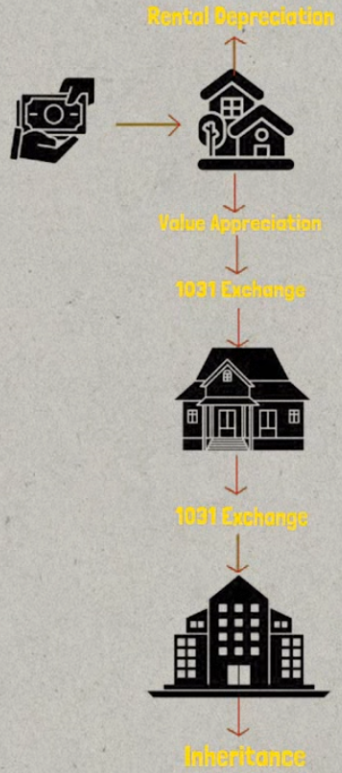
1031 Exchange Rule Explained — Illustration by author
Normally you would have to pay capital gains when you sell a property. However, using the 1031 exchange rule, I can sell one similar asset and buy another similar asset.
In this case, selling a rental property and buying a bigger rental property. And I do not have to pay capital gains on that first sale.
I can continue to kick the can down the road indefinitely by trading up to bigger and bigger properties and offsetting more and more of the rental income through depreciation.
But that’s not all.
One day, when I eventually die, I could pass that property onto my heir and I still don’t have to pay capital gains.
This is how daddy Trump created generational wealth without having to pay any capital gains taxes on any of those properties and passed it along for Donald Trump.
The good news is I do not have to be rich to start this.
My family friend works a minimum-wage warehouse job. She has lived frugally for years and now owns 3 rental properties.
I just have to start with a rental property that you can afford and manage, then I’ll leverage tax deductions and deferral to keep going from there.
3. Long-term Capital Gains
That being said, real estate and owning a business are not the only ways the super-rich grow their wealth.
It is very common for a significant portion of their cash to come from capital gains in the stock market.
When I own an asset for over a year, any capital gains would fall into the long-term capital gains tax bracket which is much better than the regular income tax bracket.
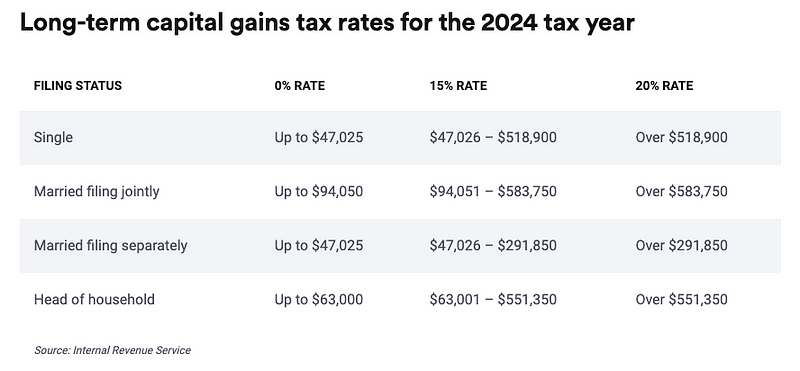
Long-Term Capital Gains Tax Bracket 2024
If you have $94,000 in long-term capital gains and married filing jointly, you are paying 0% in taxes whereas the corresponding income tax bracket would be 12% for short-term capital gains.
If you’re making $583,000 in long-term capital gains, you are in the 15% tax bracket whereas the corresponding income tax bracket would be 35% in short-term capital gain taxes.
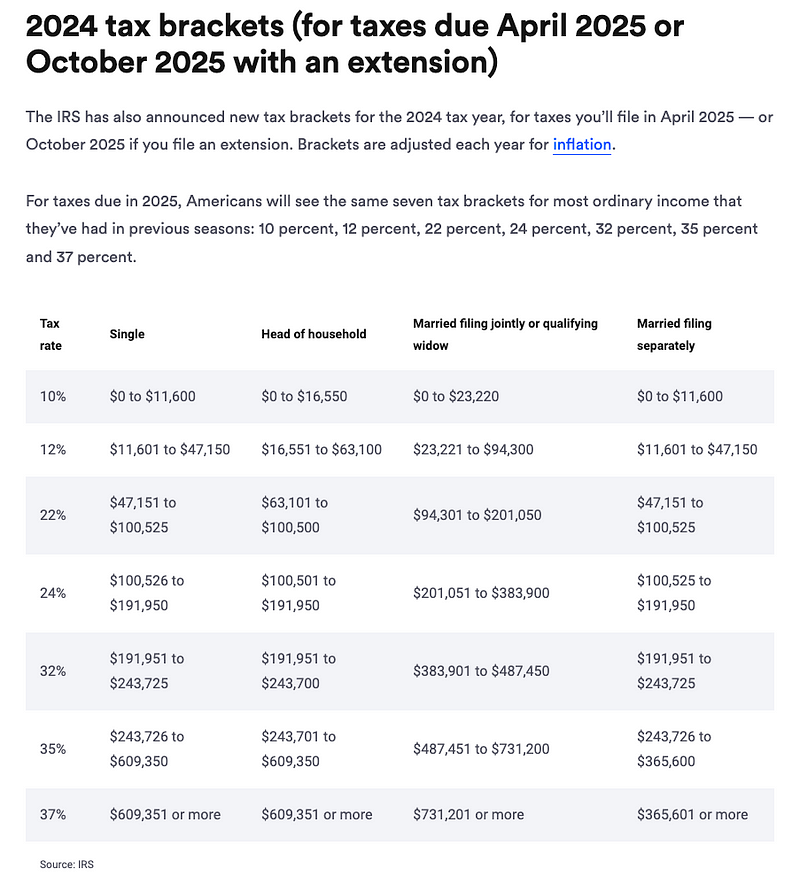
Short-Term Capital Gains / Income Tax Bracket 2024
Fortunately, we do not need to be super rich to take advantage of the long-term capital gains tax bracket right now.
One popular security to own is an S&P 500 ETF.
If I invested just $100 per week in the S&P 500, that would grow to over $1 million by the time I turned 65 which I could use to fund my retirement and pay very little in taxes.
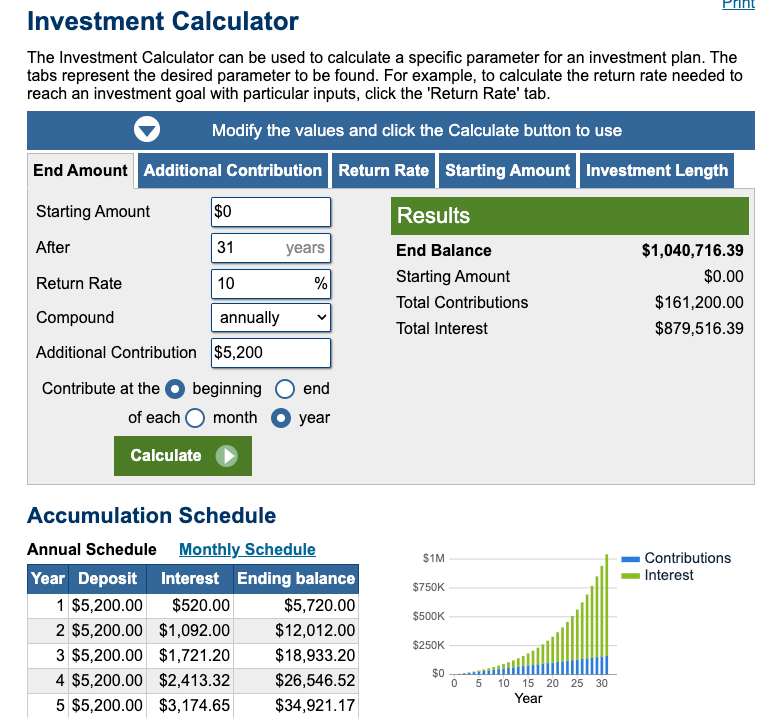
S&P 500 Investment Returns
4. Mega Backdoor Roth
Long-term capital gains are not the only way that the rich shield their investments from taxes.
There is a very interesting strategy called the Mega Backdoor Roth IRA.
A Roth IRA is an account where I can invest post-tax money in securities. When I withdraw money later, I am shielded from paying taxes on any of the gains or dividends.
Compared to the traditional IRA where I put pre-tax dollars in, I benefit from tax savings upfront. When I pull money out, I will pay taxes in the regular income tax bracket.
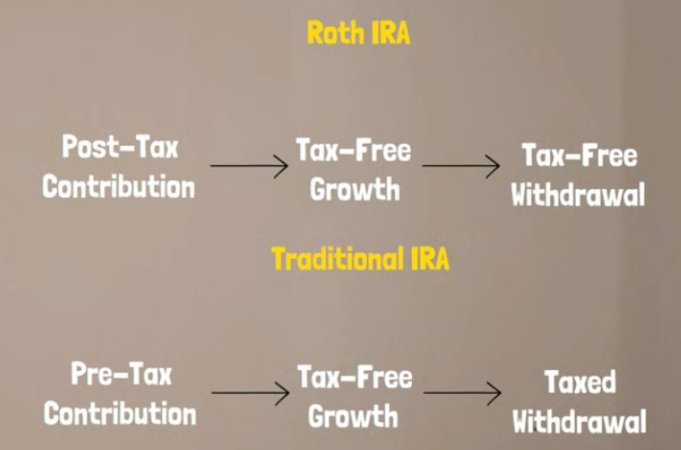
Roth IRA VS Traditional IRA — Illustration by author
So for the super-rich, having a lot of money in a Roth IRA is incredibly powerful because they don’t have to pay any taxes when they take it out.
Normally when I put money into a Roth IRA, I am only allowed to put $7,000 if I am single making less than $146,000 that year.
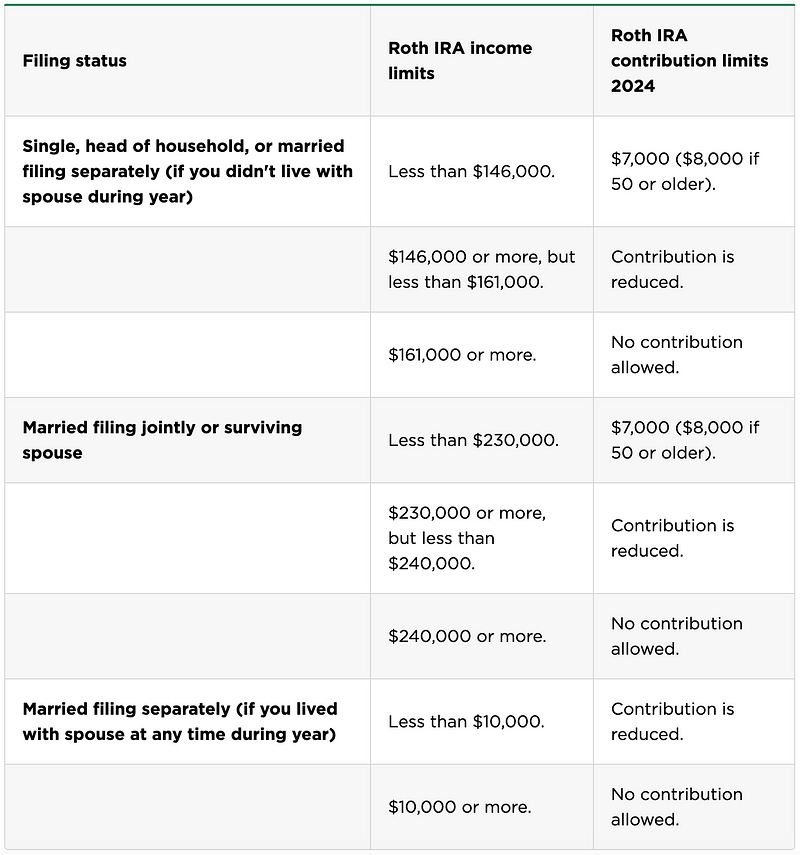
Roth IRA Contribution Limits 2024
But this is where the Mega Backdoor Roth strategy comes into play.
If I own a business, I can set up your 401K to allow for in-plan conversions.
$23,000 in my pre-tax Roth 401K
$46,000 in my post-tax Traditional 401K which can then be rolled over into a Rollover Roth IRA
With the Mega Backdoor Roth strategy, I can not only put money into a Roth IRA despite making above my income limit but also put almost 7 times the amount of money ($7,000 x 6.57 = $46,000).
This means I can redeem up to $69,000 from my annual income for tax savings benefits.
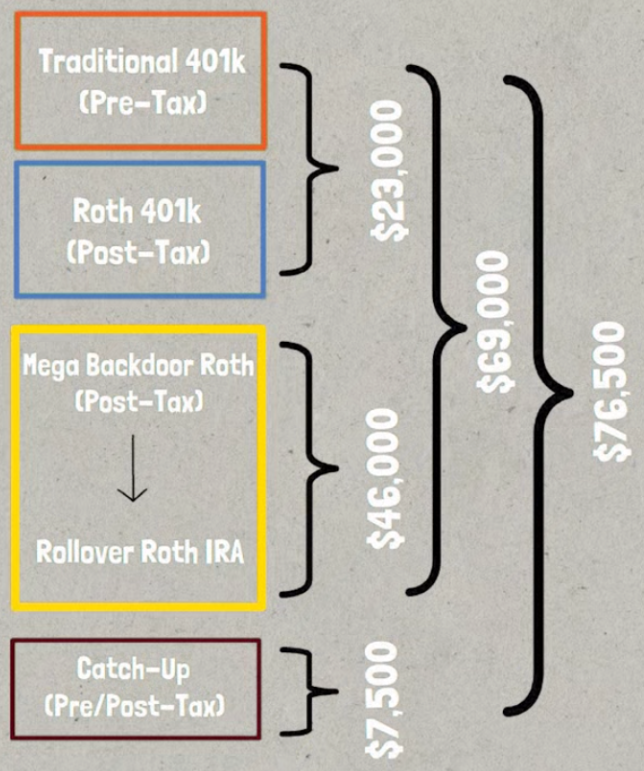
Mega Backdoor Roth and Catch-up Contribution Limit — Illustration by author
I am 33 but if you’re over the age of 50, you can put an extra $7,500 because you get extra space in your 401k for what’s called a Catch-up Contribution.
Between the Roth 401k and the Mega Backdoor Roth IRA, and Catch-up Contribution, you can contribute up to $76,500 into tax-sheltered accounts in 2024 if you’re over 50.
If you and your partner do this for 10 years and have average stock market returns invested in the S&P 500, you will have $2,682,000 in a Roth IRA tax-free to retire with.
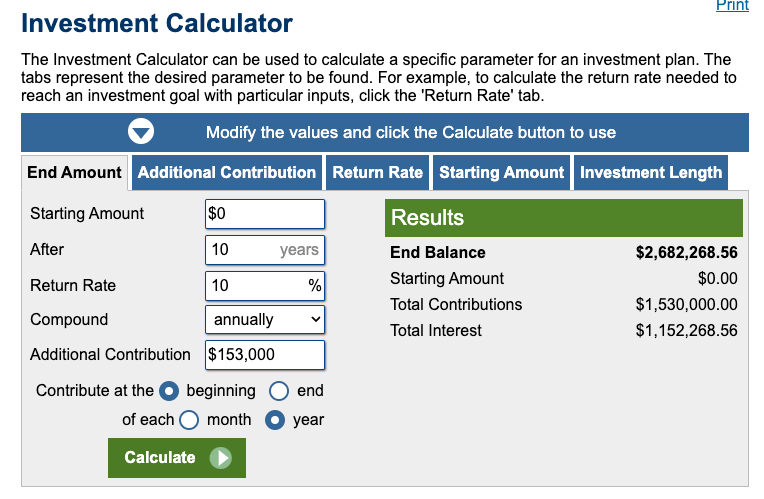
S&P 500 Investment Returns
If you guys do this strategy for 20 years, you’ll have over $9.5 million in a Roth IRA 100% tax-free to retire with.
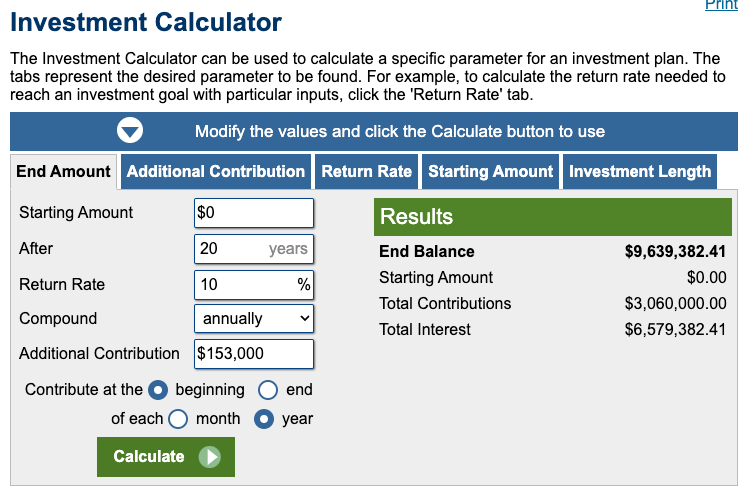
S&P 500 Investment Returns
Now even if you don’t plan on having a business, there is a chance that your company does allow for a Mega Backdoor Roth strategy although it is rare.
If you’re curious if your company allows you to execute this strategy, you need to determine if your plan allows for after-tax contributions plus an in-plan Roth conversion.
But even if they don’t offer that, you can still take advantage of 401K employer matching, Roth IRA, and HSA (Health Savings Account) to squeeze out as much of our tax-sheltered accounts as possible.
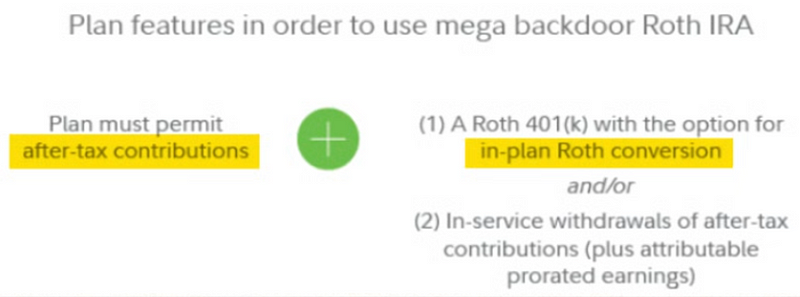
Mega Backdoor Roth IRA Company Requirements
So What Now?
I mentioned the power of real estate as an investment.
When you’re thinking about your primary residence, you can indeed get a loan to purchase the home and leverage the equity in your home through a home equity line of credit.
However, there are many unique downsides to owning a home as your primary residence.
One common pitfall many people fall into is buying a home as their primary residence and thinking it will be a good investment.
In many cases, it is much better to rent and then invest the difference in other assets.
I shared our experiences and calculations on the costs of owning a home compared to renting. Check it out HERE.
Catch you on the flip side.

Reply